Literature Review on Governance within Digital Business Ecosystems
VerifiedAdded on 2023/04/22
|14
|4236
|142
Literature Review
AI Summary
This literature review delves into the governance within digital business ecosystems (DBE), examining the effectiveness of policies, processes, and their influence on organizational operations. It highlights the DBE's role in achieving competitive advantages through innovation and managing business properties like scalability and sustainability. The review discusses the importance of DBEs, their elements, and the shift towards digital approaches. It emphasizes the need for proper governance to address the challenges of managing digital services and operations, including the role of the governance team, and the importance of innovation, technological advancement, and real-time market knowledge for organizations. The analysis explores the integration of digital tools, customer engagement, and value exchange within the DBE, while also acknowledging the complexity that arises and the necessity for training and governance to manage the digital ecosystem effectively. The review identifies research gaps related to the lack of implementation of policies and processes for managing digital services, affecting the business ecosystem.
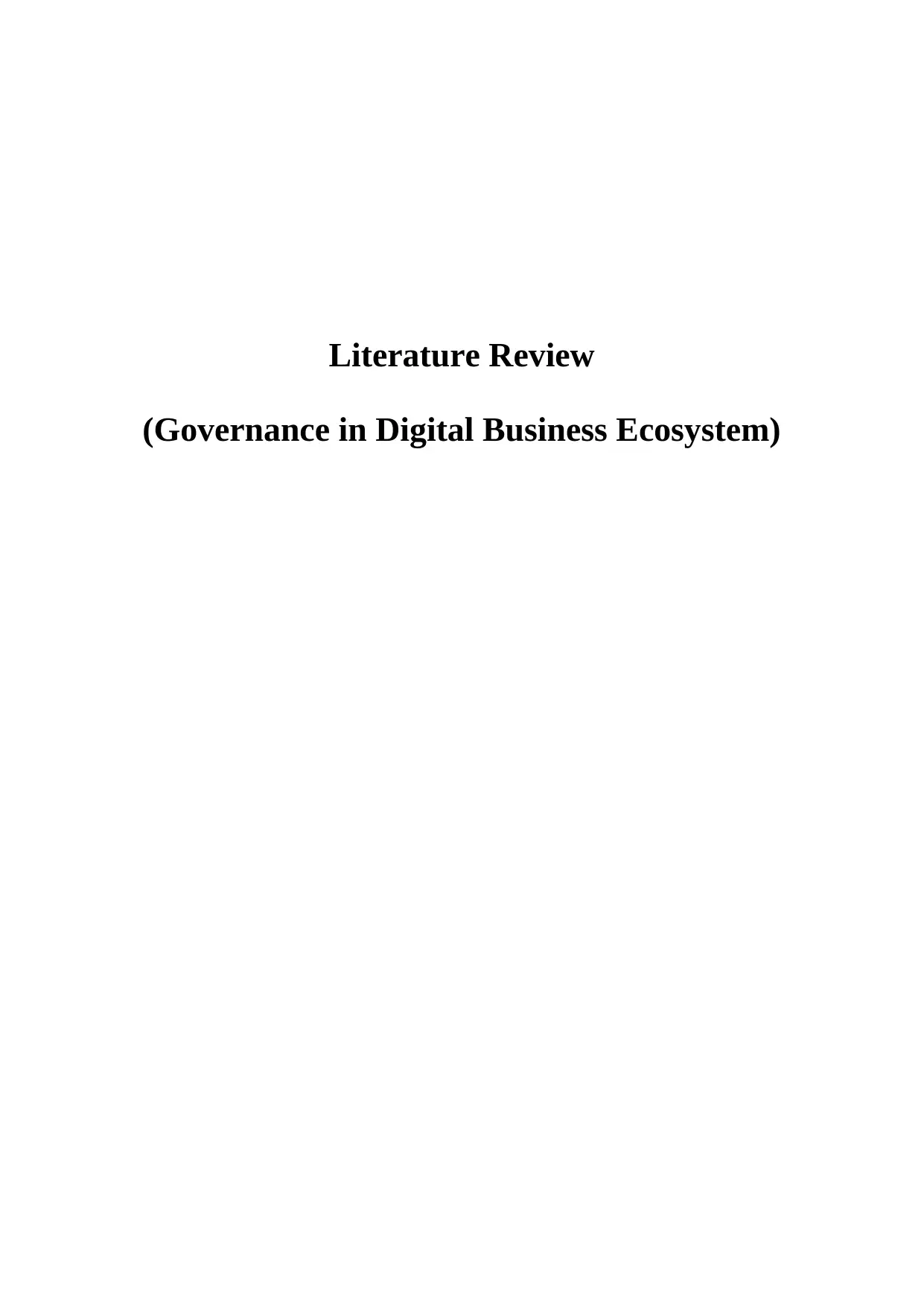
Literature Review
(Governance in Digital Business Ecosystem)
(Governance in Digital Business Ecosystem)
Paraphrase This Document
Need a fresh take? Get an instant paraphrase of this document with our AI Paraphraser
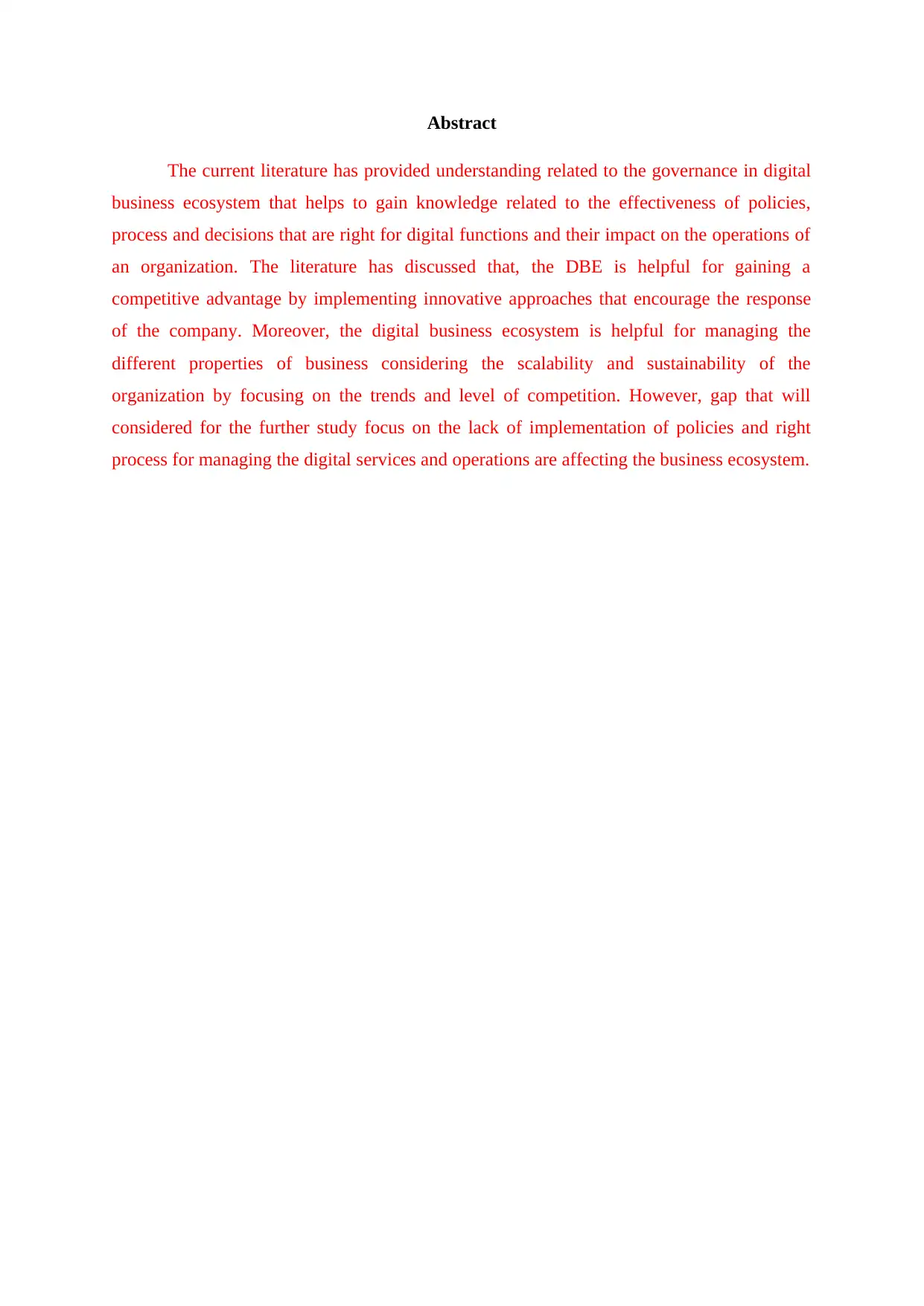
Abstract
The current literature has provided understanding related to the governance in digital
business ecosystem that helps to gain knowledge related to the effectiveness of policies,
process and decisions that are right for digital functions and their impact on the operations of
an organization. The literature has discussed that, the DBE is helpful for gaining a
competitive advantage by implementing innovative approaches that encourage the response
of the company. Moreover, the digital business ecosystem is helpful for managing the
different properties of business considering the scalability and sustainability of the
organization by focusing on the trends and level of competition. However, gap that will
considered for the further study focus on the lack of implementation of policies and right
process for managing the digital services and operations are affecting the business ecosystem.
The current literature has provided understanding related to the governance in digital
business ecosystem that helps to gain knowledge related to the effectiveness of policies,
process and decisions that are right for digital functions and their impact on the operations of
an organization. The literature has discussed that, the DBE is helpful for gaining a
competitive advantage by implementing innovative approaches that encourage the response
of the company. Moreover, the digital business ecosystem is helpful for managing the
different properties of business considering the scalability and sustainability of the
organization by focusing on the trends and level of competition. However, gap that will
considered for the further study focus on the lack of implementation of policies and right
process for managing the digital services and operations are affecting the business ecosystem.
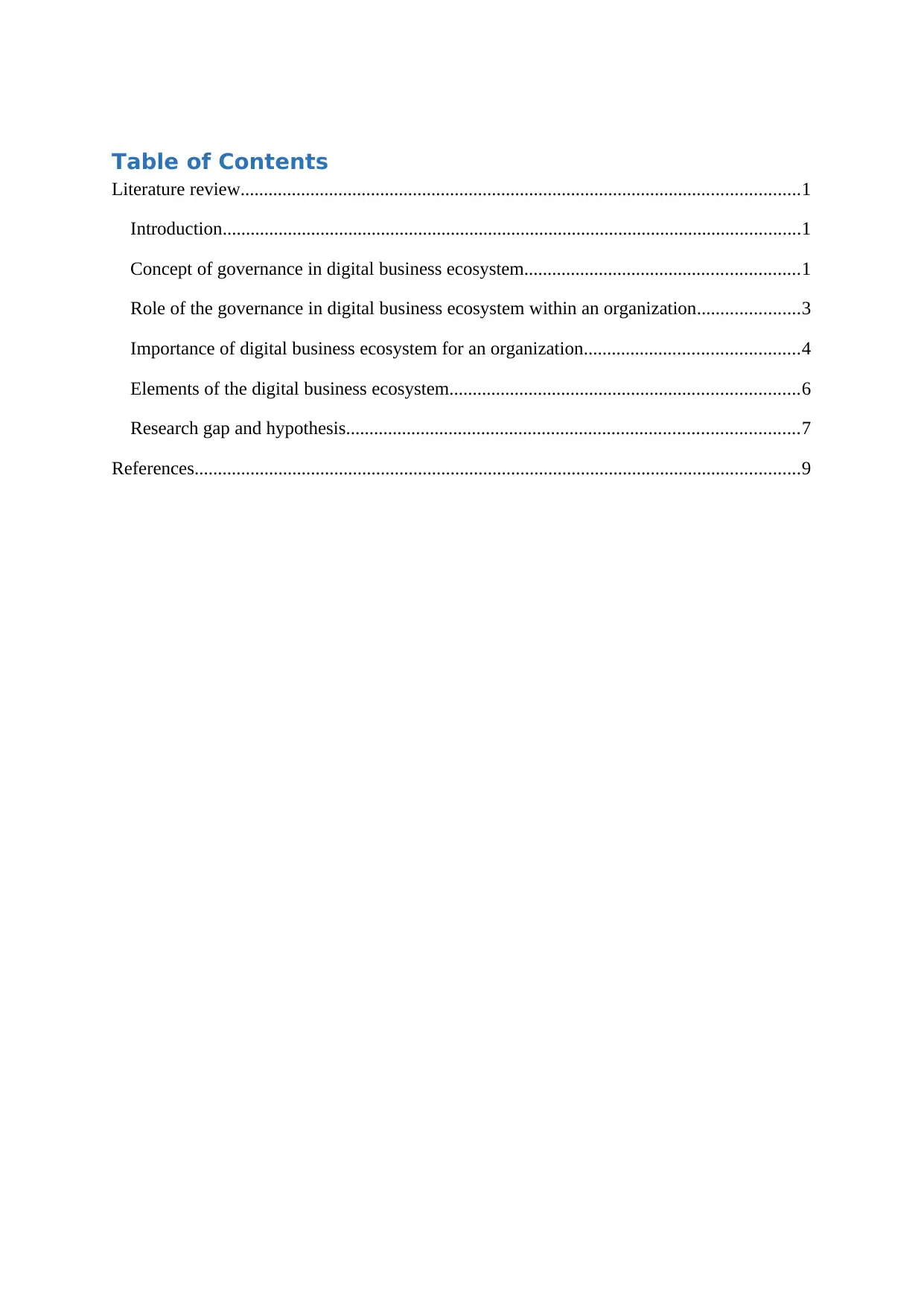
Table of Contents
Literature review........................................................................................................................1
Introduction............................................................................................................................1
Concept of governance in digital business ecosystem...........................................................1
Role of the governance in digital business ecosystem within an organization......................3
Importance of digital business ecosystem for an organization..............................................4
Elements of the digital business ecosystem...........................................................................6
Research gap and hypothesis.................................................................................................7
References..................................................................................................................................9
Literature review........................................................................................................................1
Introduction............................................................................................................................1
Concept of governance in digital business ecosystem...........................................................1
Role of the governance in digital business ecosystem within an organization......................3
Importance of digital business ecosystem for an organization..............................................4
Elements of the digital business ecosystem...........................................................................6
Research gap and hypothesis.................................................................................................7
References..................................................................................................................................9
⊘ This is a preview!⊘
Do you want full access?
Subscribe today to unlock all pages.

Trusted by 1+ million students worldwide
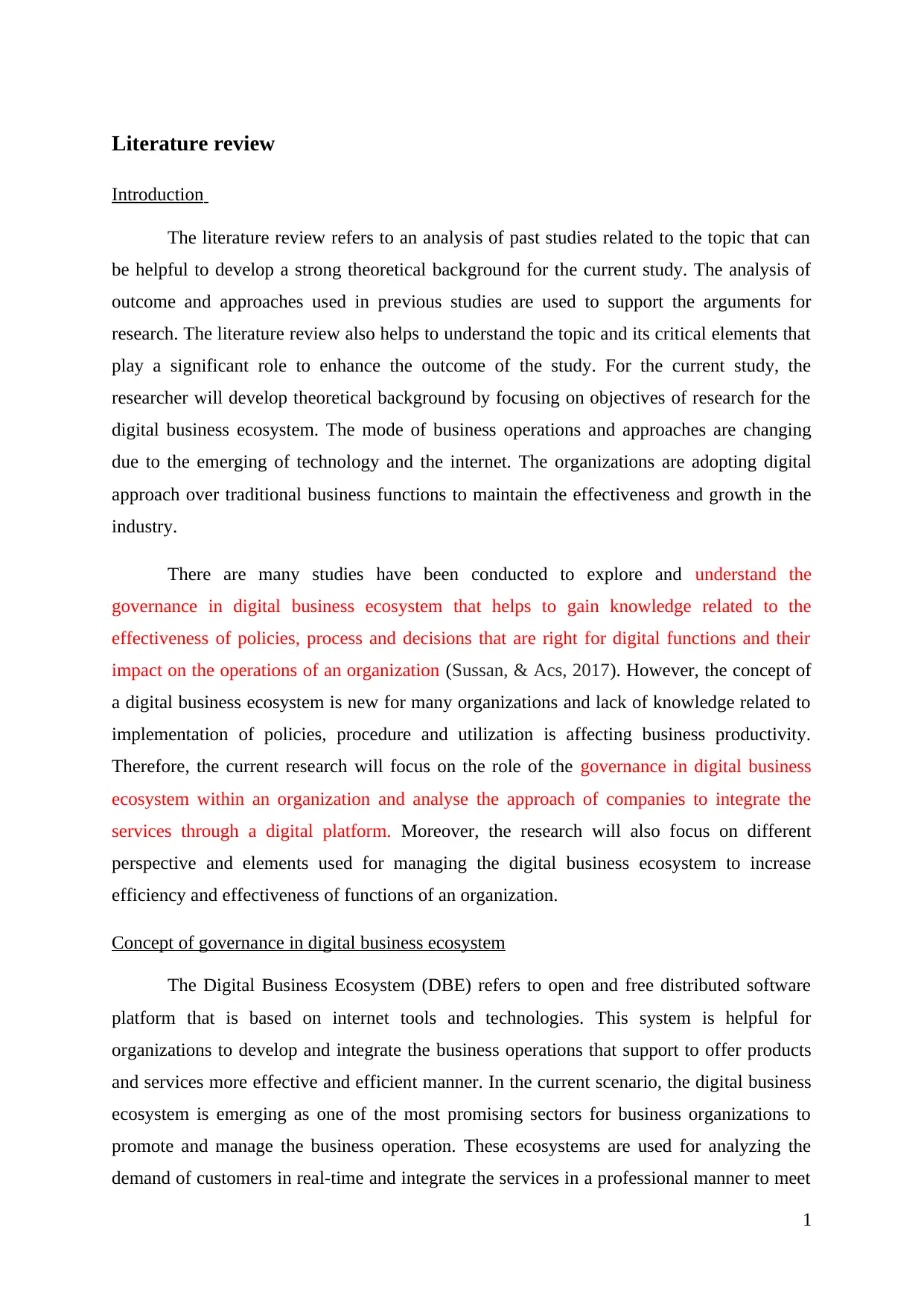
Literature review
Introduction
The literature review refers to an analysis of past studies related to the topic that can
be helpful to develop a strong theoretical background for the current study. The analysis of
outcome and approaches used in previous studies are used to support the arguments for
research. The literature review also helps to understand the topic and its critical elements that
play a significant role to enhance the outcome of the study. For the current study, the
researcher will develop theoretical background by focusing on objectives of research for the
digital business ecosystem. The mode of business operations and approaches are changing
due to the emerging of technology and the internet. The organizations are adopting digital
approach over traditional business functions to maintain the effectiveness and growth in the
industry.
There are many studies have been conducted to explore and understand the
governance in digital business ecosystem that helps to gain knowledge related to the
effectiveness of policies, process and decisions that are right for digital functions and their
impact on the operations of an organization (Sussan, & Acs, 2017). However, the concept of
a digital business ecosystem is new for many organizations and lack of knowledge related to
implementation of policies, procedure and utilization is affecting business productivity.
Therefore, the current research will focus on the role of the governance in digital business
ecosystem within an organization and analyse the approach of companies to integrate the
services through a digital platform. Moreover, the research will also focus on different
perspective and elements used for managing the digital business ecosystem to increase
efficiency and effectiveness of functions of an organization.
Concept of governance in digital business ecosystem
The Digital Business Ecosystem (DBE) refers to open and free distributed software
platform that is based on internet tools and technologies. This system is helpful for
organizations to develop and integrate the business operations that support to offer products
and services more effective and efficient manner. In the current scenario, the digital business
ecosystem is emerging as one of the most promising sectors for business organizations to
promote and manage the business operation. These ecosystems are used for analyzing the
demand of customers in real-time and integrate the services in a professional manner to meet
1
Introduction
The literature review refers to an analysis of past studies related to the topic that can
be helpful to develop a strong theoretical background for the current study. The analysis of
outcome and approaches used in previous studies are used to support the arguments for
research. The literature review also helps to understand the topic and its critical elements that
play a significant role to enhance the outcome of the study. For the current study, the
researcher will develop theoretical background by focusing on objectives of research for the
digital business ecosystem. The mode of business operations and approaches are changing
due to the emerging of technology and the internet. The organizations are adopting digital
approach over traditional business functions to maintain the effectiveness and growth in the
industry.
There are many studies have been conducted to explore and understand the
governance in digital business ecosystem that helps to gain knowledge related to the
effectiveness of policies, process and decisions that are right for digital functions and their
impact on the operations of an organization (Sussan, & Acs, 2017). However, the concept of
a digital business ecosystem is new for many organizations and lack of knowledge related to
implementation of policies, procedure and utilization is affecting business productivity.
Therefore, the current research will focus on the role of the governance in digital business
ecosystem within an organization and analyse the approach of companies to integrate the
services through a digital platform. Moreover, the research will also focus on different
perspective and elements used for managing the digital business ecosystem to increase
efficiency and effectiveness of functions of an organization.
Concept of governance in digital business ecosystem
The Digital Business Ecosystem (DBE) refers to open and free distributed software
platform that is based on internet tools and technologies. This system is helpful for
organizations to develop and integrate the business operations that support to offer products
and services more effective and efficient manner. In the current scenario, the digital business
ecosystem is emerging as one of the most promising sectors for business organizations to
promote and manage the business operation. These ecosystems are used for analyzing the
demand of customers in real-time and integrate the services in a professional manner to meet
1
Paraphrase This Document
Need a fresh take? Get an instant paraphrase of this document with our AI Paraphraser
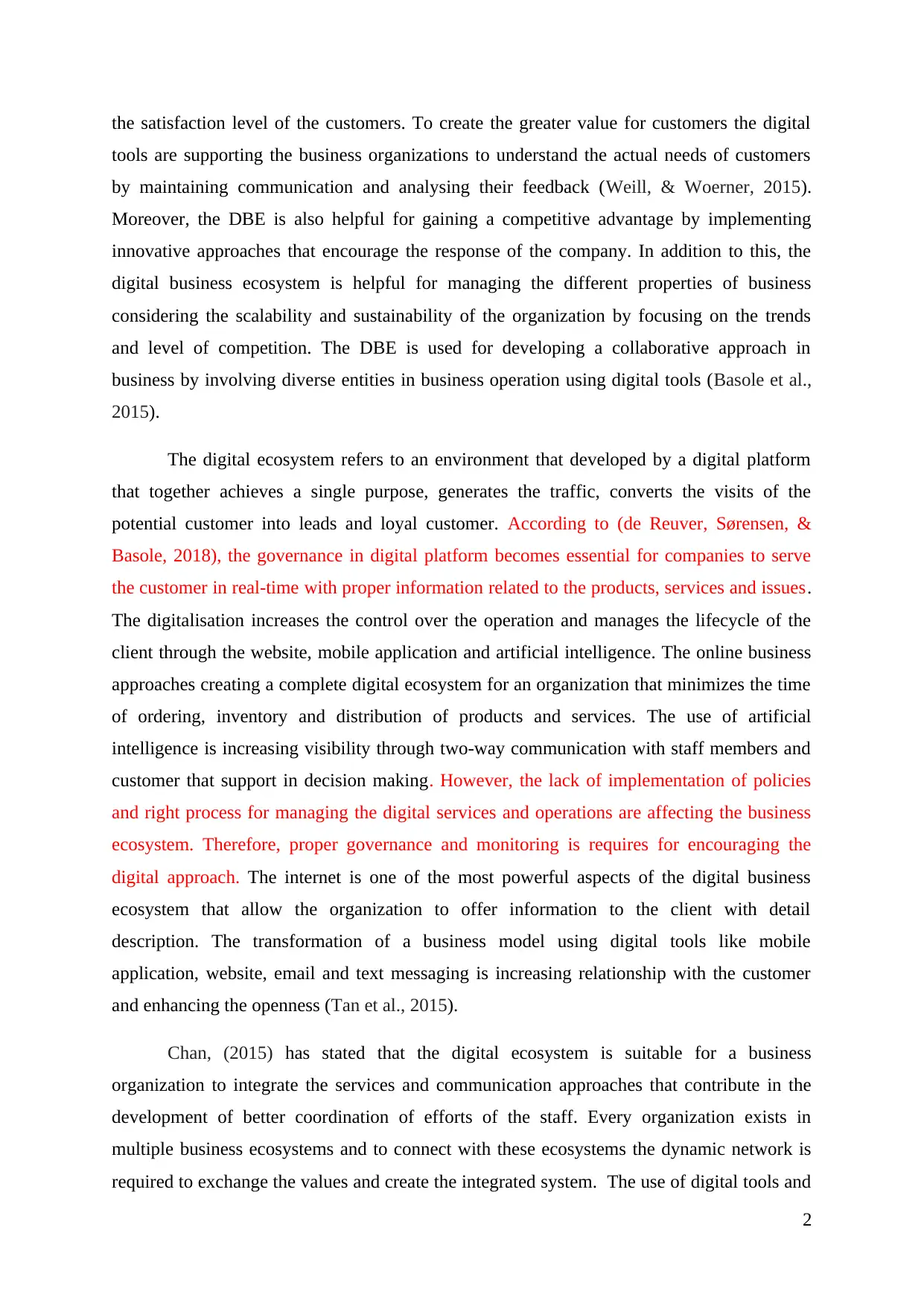
the satisfaction level of the customers. To create the greater value for customers the digital
tools are supporting the business organizations to understand the actual needs of customers
by maintaining communication and analysing their feedback (Weill, & Woerner, 2015).
Moreover, the DBE is also helpful for gaining a competitive advantage by implementing
innovative approaches that encourage the response of the company. In addition to this, the
digital business ecosystem is helpful for managing the different properties of business
considering the scalability and sustainability of the organization by focusing on the trends
and level of competition. The DBE is used for developing a collaborative approach in
business by involving diverse entities in business operation using digital tools (Basole et al.,
2015).
The digital ecosystem refers to an environment that developed by a digital platform
that together achieves a single purpose, generates the traffic, converts the visits of the
potential customer into leads and loyal customer. According to (de Reuver, Sørensen, &
Basole, 2018), the governance in digital platform becomes essential for companies to serve
the customer in real-time with proper information related to the products, services and issues.
The digitalisation increases the control over the operation and manages the lifecycle of the
client through the website, mobile application and artificial intelligence. The online business
approaches creating a complete digital ecosystem for an organization that minimizes the time
of ordering, inventory and distribution of products and services. The use of artificial
intelligence is increasing visibility through two-way communication with staff members and
customer that support in decision making. However, the lack of implementation of policies
and right process for managing the digital services and operations are affecting the business
ecosystem. Therefore, proper governance and monitoring is requires for encouraging the
digital approach. The internet is one of the most powerful aspects of the digital business
ecosystem that allow the organization to offer information to the client with detail
description. The transformation of a business model using digital tools like mobile
application, website, email and text messaging is increasing relationship with the customer
and enhancing the openness (Tan et al., 2015).
Chan, (2015) has stated that the digital ecosystem is suitable for a business
organization to integrate the services and communication approaches that contribute in the
development of better coordination of efforts of the staff. Every organization exists in
multiple business ecosystems and to connect with these ecosystems the dynamic network is
required to exchange the values and create the integrated system. The use of digital tools and
2
tools are supporting the business organizations to understand the actual needs of customers
by maintaining communication and analysing their feedback (Weill, & Woerner, 2015).
Moreover, the DBE is also helpful for gaining a competitive advantage by implementing
innovative approaches that encourage the response of the company. In addition to this, the
digital business ecosystem is helpful for managing the different properties of business
considering the scalability and sustainability of the organization by focusing on the trends
and level of competition. The DBE is used for developing a collaborative approach in
business by involving diverse entities in business operation using digital tools (Basole et al.,
2015).
The digital ecosystem refers to an environment that developed by a digital platform
that together achieves a single purpose, generates the traffic, converts the visits of the
potential customer into leads and loyal customer. According to (de Reuver, Sørensen, &
Basole, 2018), the governance in digital platform becomes essential for companies to serve
the customer in real-time with proper information related to the products, services and issues.
The digitalisation increases the control over the operation and manages the lifecycle of the
client through the website, mobile application and artificial intelligence. The online business
approaches creating a complete digital ecosystem for an organization that minimizes the time
of ordering, inventory and distribution of products and services. The use of artificial
intelligence is increasing visibility through two-way communication with staff members and
customer that support in decision making. However, the lack of implementation of policies
and right process for managing the digital services and operations are affecting the business
ecosystem. Therefore, proper governance and monitoring is requires for encouraging the
digital approach. The internet is one of the most powerful aspects of the digital business
ecosystem that allow the organization to offer information to the client with detail
description. The transformation of a business model using digital tools like mobile
application, website, email and text messaging is increasing relationship with the customer
and enhancing the openness (Tan et al., 2015).
Chan, (2015) has stated that the digital ecosystem is suitable for a business
organization to integrate the services and communication approaches that contribute in the
development of better coordination of efforts of the staff. Every organization exists in
multiple business ecosystems and to connect with these ecosystems the dynamic network is
required to exchange the values and create the integrated system. The use of digital tools and
2
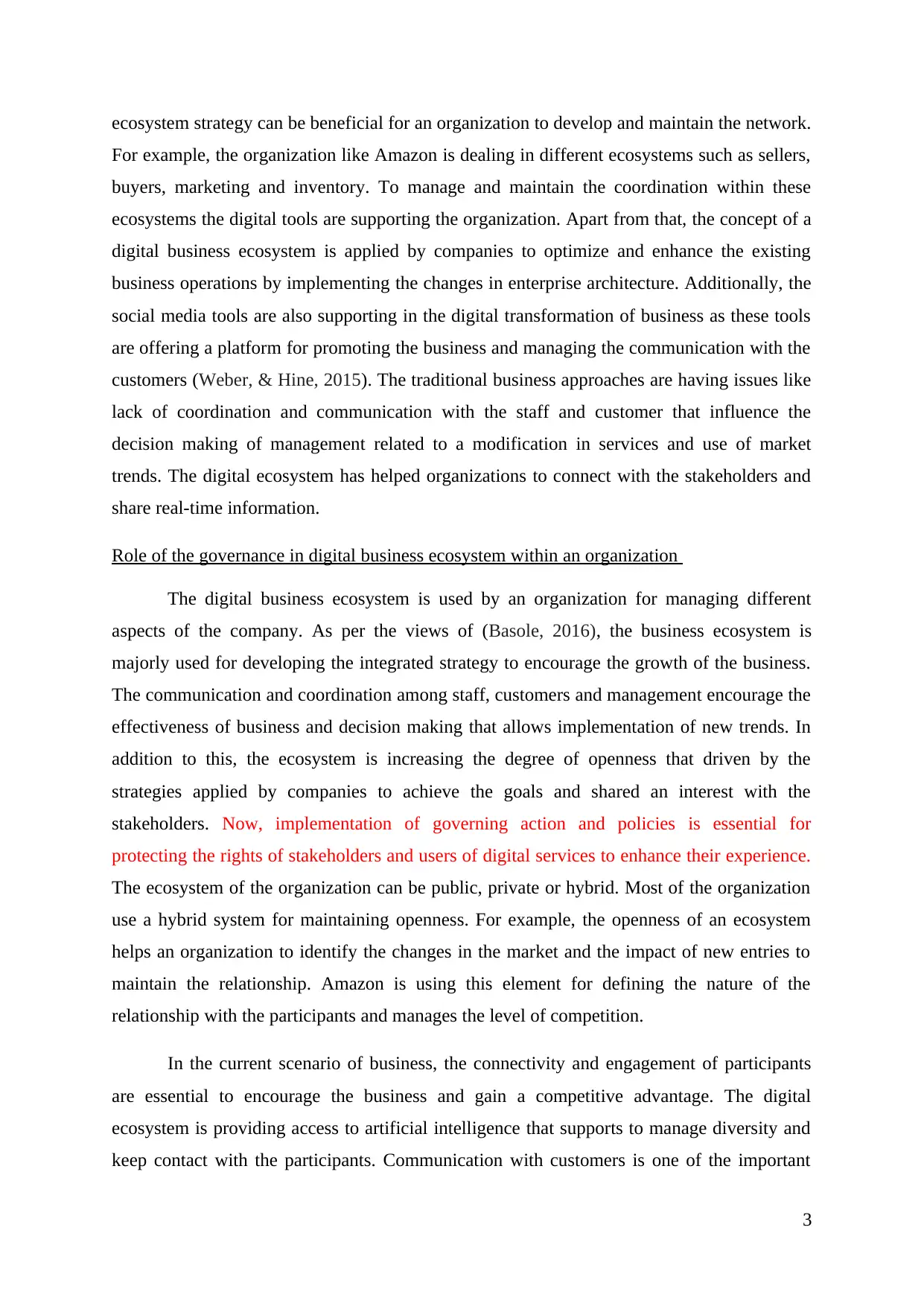
ecosystem strategy can be beneficial for an organization to develop and maintain the network.
For example, the organization like Amazon is dealing in different ecosystems such as sellers,
buyers, marketing and inventory. To manage and maintain the coordination within these
ecosystems the digital tools are supporting the organization. Apart from that, the concept of a
digital business ecosystem is applied by companies to optimize and enhance the existing
business operations by implementing the changes in enterprise architecture. Additionally, the
social media tools are also supporting in the digital transformation of business as these tools
are offering a platform for promoting the business and managing the communication with the
customers (Weber, & Hine, 2015). The traditional business approaches are having issues like
lack of coordination and communication with the staff and customer that influence the
decision making of management related to a modification in services and use of market
trends. The digital ecosystem has helped organizations to connect with the stakeholders and
share real-time information.
Role of the governance in digital business ecosystem within an organization
The digital business ecosystem is used by an organization for managing different
aspects of the company. As per the views of (Basole, 2016), the business ecosystem is
majorly used for developing the integrated strategy to encourage the growth of the business.
The communication and coordination among staff, customers and management encourage the
effectiveness of business and decision making that allows implementation of new trends. In
addition to this, the ecosystem is increasing the degree of openness that driven by the
strategies applied by companies to achieve the goals and shared an interest with the
stakeholders. Now, implementation of governing action and policies is essential for
protecting the rights of stakeholders and users of digital services to enhance their experience.
The ecosystem of the organization can be public, private or hybrid. Most of the organization
use a hybrid system for maintaining openness. For example, the openness of an ecosystem
helps an organization to identify the changes in the market and the impact of new entries to
maintain the relationship. Amazon is using this element for defining the nature of the
relationship with the participants and manages the level of competition.
In the current scenario of business, the connectivity and engagement of participants
are essential to encourage the business and gain a competitive advantage. The digital
ecosystem is providing access to artificial intelligence that supports to manage diversity and
keep contact with the participants. Communication with customers is one of the important
3
For example, the organization like Amazon is dealing in different ecosystems such as sellers,
buyers, marketing and inventory. To manage and maintain the coordination within these
ecosystems the digital tools are supporting the organization. Apart from that, the concept of a
digital business ecosystem is applied by companies to optimize and enhance the existing
business operations by implementing the changes in enterprise architecture. Additionally, the
social media tools are also supporting in the digital transformation of business as these tools
are offering a platform for promoting the business and managing the communication with the
customers (Weber, & Hine, 2015). The traditional business approaches are having issues like
lack of coordination and communication with the staff and customer that influence the
decision making of management related to a modification in services and use of market
trends. The digital ecosystem has helped organizations to connect with the stakeholders and
share real-time information.
Role of the governance in digital business ecosystem within an organization
The digital business ecosystem is used by an organization for managing different
aspects of the company. As per the views of (Basole, 2016), the business ecosystem is
majorly used for developing the integrated strategy to encourage the growth of the business.
The communication and coordination among staff, customers and management encourage the
effectiveness of business and decision making that allows implementation of new trends. In
addition to this, the ecosystem is increasing the degree of openness that driven by the
strategies applied by companies to achieve the goals and shared an interest with the
stakeholders. Now, implementation of governing action and policies is essential for
protecting the rights of stakeholders and users of digital services to enhance their experience.
The ecosystem of the organization can be public, private or hybrid. Most of the organization
use a hybrid system for maintaining openness. For example, the openness of an ecosystem
helps an organization to identify the changes in the market and the impact of new entries to
maintain the relationship. Amazon is using this element for defining the nature of the
relationship with the participants and manages the level of competition.
In the current scenario of business, the connectivity and engagement of participants
are essential to encourage the business and gain a competitive advantage. The digital
ecosystem is providing access to artificial intelligence that supports to manage diversity and
keep contact with the participants. Communication with customers is one of the important
3
⊘ This is a preview!⊘
Do you want full access?
Subscribe today to unlock all pages.

Trusted by 1+ million students worldwide
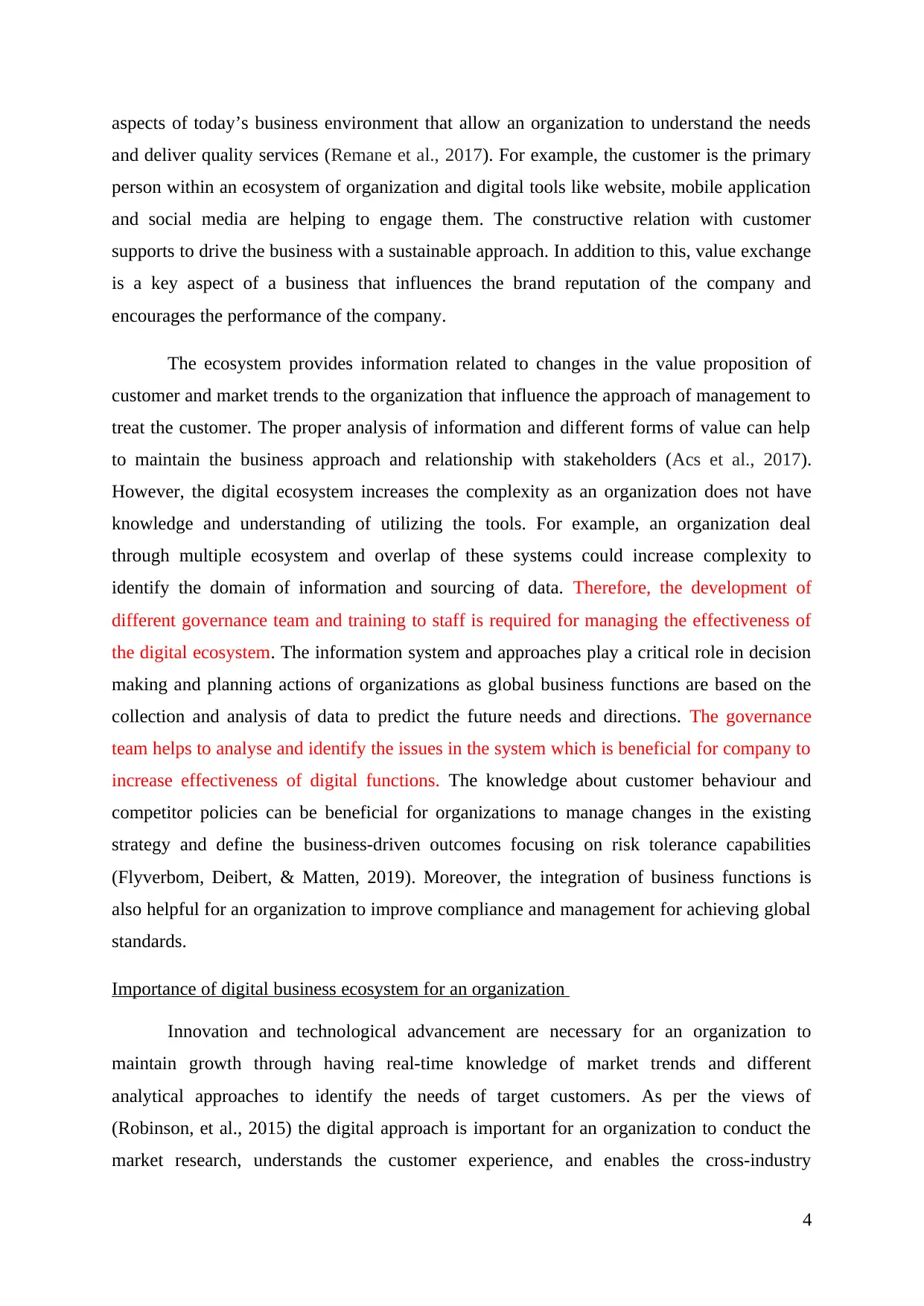
aspects of today’s business environment that allow an organization to understand the needs
and deliver quality services (Remane et al., 2017). For example, the customer is the primary
person within an ecosystem of organization and digital tools like website, mobile application
and social media are helping to engage them. The constructive relation with customer
supports to drive the business with a sustainable approach. In addition to this, value exchange
is a key aspect of a business that influences the brand reputation of the company and
encourages the performance of the company.
The ecosystem provides information related to changes in the value proposition of
customer and market trends to the organization that influence the approach of management to
treat the customer. The proper analysis of information and different forms of value can help
to maintain the business approach and relationship with stakeholders (Acs et al., 2017).
However, the digital ecosystem increases the complexity as an organization does not have
knowledge and understanding of utilizing the tools. For example, an organization deal
through multiple ecosystem and overlap of these systems could increase complexity to
identify the domain of information and sourcing of data. Therefore, the development of
different governance team and training to staff is required for managing the effectiveness of
the digital ecosystem. The information system and approaches play a critical role in decision
making and planning actions of organizations as global business functions are based on the
collection and analysis of data to predict the future needs and directions. The governance
team helps to analyse and identify the issues in the system which is beneficial for company to
increase effectiveness of digital functions. The knowledge about customer behaviour and
competitor policies can be beneficial for organizations to manage changes in the existing
strategy and define the business-driven outcomes focusing on risk tolerance capabilities
(Flyverbom, Deibert, & Matten, 2019). Moreover, the integration of business functions is
also helpful for an organization to improve compliance and management for achieving global
standards.
Importance of digital business ecosystem for an organization
Innovation and technological advancement are necessary for an organization to
maintain growth through having real-time knowledge of market trends and different
analytical approaches to identify the needs of target customers. As per the views of
(Robinson, et al., 2015) the digital approach is important for an organization to conduct the
market research, understands the customer experience, and enables the cross-industry
4
and deliver quality services (Remane et al., 2017). For example, the customer is the primary
person within an ecosystem of organization and digital tools like website, mobile application
and social media are helping to engage them. The constructive relation with customer
supports to drive the business with a sustainable approach. In addition to this, value exchange
is a key aspect of a business that influences the brand reputation of the company and
encourages the performance of the company.
The ecosystem provides information related to changes in the value proposition of
customer and market trends to the organization that influence the approach of management to
treat the customer. The proper analysis of information and different forms of value can help
to maintain the business approach and relationship with stakeholders (Acs et al., 2017).
However, the digital ecosystem increases the complexity as an organization does not have
knowledge and understanding of utilizing the tools. For example, an organization deal
through multiple ecosystem and overlap of these systems could increase complexity to
identify the domain of information and sourcing of data. Therefore, the development of
different governance team and training to staff is required for managing the effectiveness of
the digital ecosystem. The information system and approaches play a critical role in decision
making and planning actions of organizations as global business functions are based on the
collection and analysis of data to predict the future needs and directions. The governance
team helps to analyse and identify the issues in the system which is beneficial for company to
increase effectiveness of digital functions. The knowledge about customer behaviour and
competitor policies can be beneficial for organizations to manage changes in the existing
strategy and define the business-driven outcomes focusing on risk tolerance capabilities
(Flyverbom, Deibert, & Matten, 2019). Moreover, the integration of business functions is
also helpful for an organization to improve compliance and management for achieving global
standards.
Importance of digital business ecosystem for an organization
Innovation and technological advancement are necessary for an organization to
maintain growth through having real-time knowledge of market trends and different
analytical approaches to identify the needs of target customers. As per the views of
(Robinson, et al., 2015) the digital approach is important for an organization to conduct the
market research, understands the customer experience, and enables the cross-industry
4
Paraphrase This Document
Need a fresh take? Get an instant paraphrase of this document with our AI Paraphraser
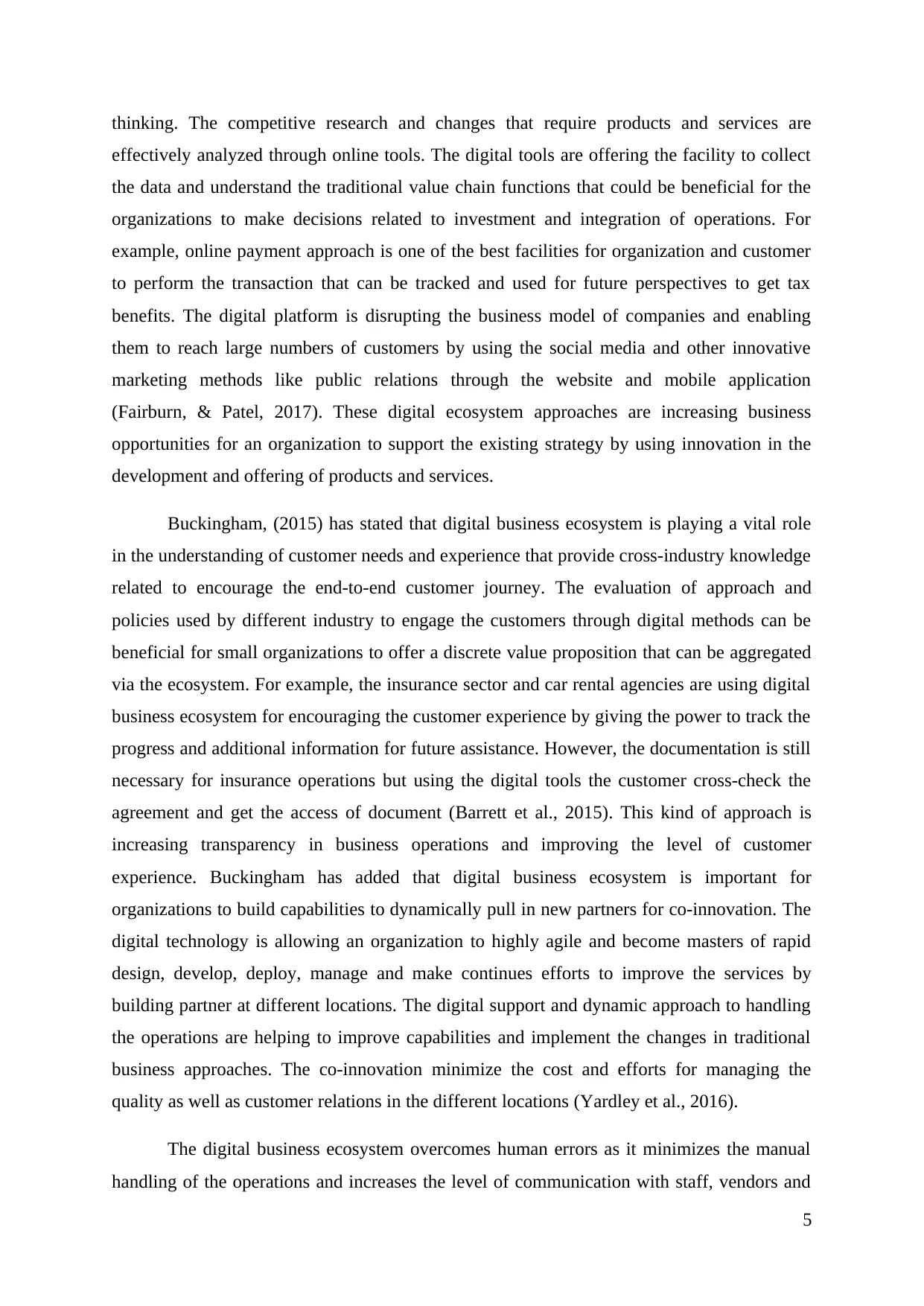
thinking. The competitive research and changes that require products and services are
effectively analyzed through online tools. The digital tools are offering the facility to collect
the data and understand the traditional value chain functions that could be beneficial for the
organizations to make decisions related to investment and integration of operations. For
example, online payment approach is one of the best facilities for organization and customer
to perform the transaction that can be tracked and used for future perspectives to get tax
benefits. The digital platform is disrupting the business model of companies and enabling
them to reach large numbers of customers by using the social media and other innovative
marketing methods like public relations through the website and mobile application
(Fairburn, & Patel, 2017). These digital ecosystem approaches are increasing business
opportunities for an organization to support the existing strategy by using innovation in the
development and offering of products and services.
Buckingham, (2015) has stated that digital business ecosystem is playing a vital role
in the understanding of customer needs and experience that provide cross-industry knowledge
related to encourage the end-to-end customer journey. The evaluation of approach and
policies used by different industry to engage the customers through digital methods can be
beneficial for small organizations to offer a discrete value proposition that can be aggregated
via the ecosystem. For example, the insurance sector and car rental agencies are using digital
business ecosystem for encouraging the customer experience by giving the power to track the
progress and additional information for future assistance. However, the documentation is still
necessary for insurance operations but using the digital tools the customer cross-check the
agreement and get the access of document (Barrett et al., 2015). This kind of approach is
increasing transparency in business operations and improving the level of customer
experience. Buckingham has added that digital business ecosystem is important for
organizations to build capabilities to dynamically pull in new partners for co-innovation. The
digital technology is allowing an organization to highly agile and become masters of rapid
design, develop, deploy, manage and make continues efforts to improve the services by
building partner at different locations. The digital support and dynamic approach to handling
the operations are helping to improve capabilities and implement the changes in traditional
business approaches. The co-innovation minimize the cost and efforts for managing the
quality as well as customer relations in the different locations (Yardley et al., 2016).
The digital business ecosystem overcomes human errors as it minimizes the manual
handling of the operations and increases the level of communication with staff, vendors and
5
effectively analyzed through online tools. The digital tools are offering the facility to collect
the data and understand the traditional value chain functions that could be beneficial for the
organizations to make decisions related to investment and integration of operations. For
example, online payment approach is one of the best facilities for organization and customer
to perform the transaction that can be tracked and used for future perspectives to get tax
benefits. The digital platform is disrupting the business model of companies and enabling
them to reach large numbers of customers by using the social media and other innovative
marketing methods like public relations through the website and mobile application
(Fairburn, & Patel, 2017). These digital ecosystem approaches are increasing business
opportunities for an organization to support the existing strategy by using innovation in the
development and offering of products and services.
Buckingham, (2015) has stated that digital business ecosystem is playing a vital role
in the understanding of customer needs and experience that provide cross-industry knowledge
related to encourage the end-to-end customer journey. The evaluation of approach and
policies used by different industry to engage the customers through digital methods can be
beneficial for small organizations to offer a discrete value proposition that can be aggregated
via the ecosystem. For example, the insurance sector and car rental agencies are using digital
business ecosystem for encouraging the customer experience by giving the power to track the
progress and additional information for future assistance. However, the documentation is still
necessary for insurance operations but using the digital tools the customer cross-check the
agreement and get the access of document (Barrett et al., 2015). This kind of approach is
increasing transparency in business operations and improving the level of customer
experience. Buckingham has added that digital business ecosystem is important for
organizations to build capabilities to dynamically pull in new partners for co-innovation. The
digital technology is allowing an organization to highly agile and become masters of rapid
design, develop, deploy, manage and make continues efforts to improve the services by
building partner at different locations. The digital support and dynamic approach to handling
the operations are helping to improve capabilities and implement the changes in traditional
business approaches. The co-innovation minimize the cost and efforts for managing the
quality as well as customer relations in the different locations (Yardley et al., 2016).
The digital business ecosystem overcomes human errors as it minimizes the manual
handling of the operations and increases the level of communication with staff, vendors and
5
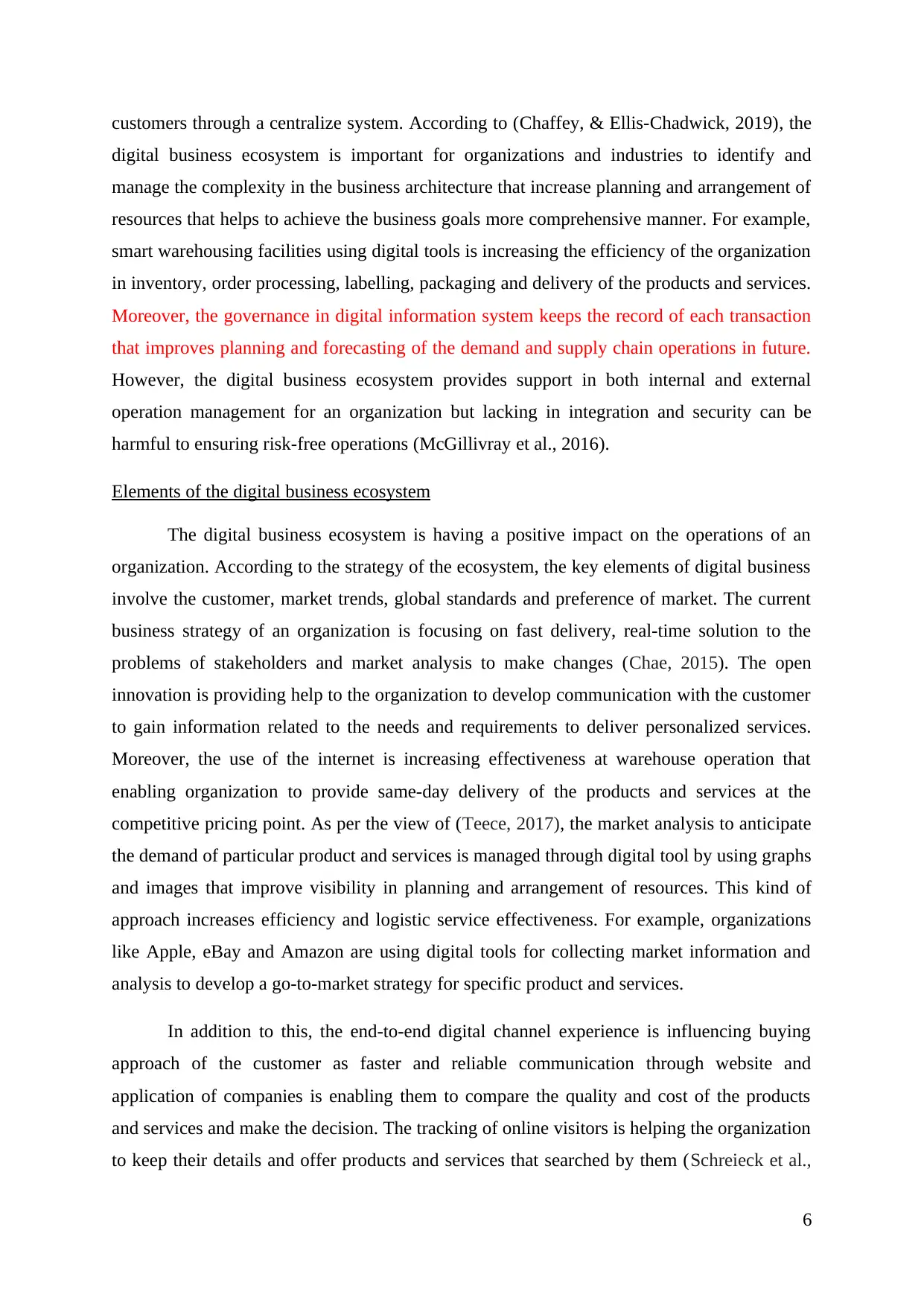
customers through a centralize system. According to (Chaffey, & Ellis-Chadwick, 2019), the
digital business ecosystem is important for organizations and industries to identify and
manage the complexity in the business architecture that increase planning and arrangement of
resources that helps to achieve the business goals more comprehensive manner. For example,
smart warehousing facilities using digital tools is increasing the efficiency of the organization
in inventory, order processing, labelling, packaging and delivery of the products and services.
Moreover, the governance in digital information system keeps the record of each transaction
that improves planning and forecasting of the demand and supply chain operations in future.
However, the digital business ecosystem provides support in both internal and external
operation management for an organization but lacking in integration and security can be
harmful to ensuring risk-free operations (McGillivray et al., 2016).
Elements of the digital business ecosystem
The digital business ecosystem is having a positive impact on the operations of an
organization. According to the strategy of the ecosystem, the key elements of digital business
involve the customer, market trends, global standards and preference of market. The current
business strategy of an organization is focusing on fast delivery, real-time solution to the
problems of stakeholders and market analysis to make changes (Chae, 2015). The open
innovation is providing help to the organization to develop communication with the customer
to gain information related to the needs and requirements to deliver personalized services.
Moreover, the use of the internet is increasing effectiveness at warehouse operation that
enabling organization to provide same-day delivery of the products and services at the
competitive pricing point. As per the view of (Teece, 2017), the market analysis to anticipate
the demand of particular product and services is managed through digital tool by using graphs
and images that improve visibility in planning and arrangement of resources. This kind of
approach increases efficiency and logistic service effectiveness. For example, organizations
like Apple, eBay and Amazon are using digital tools for collecting market information and
analysis to develop a go-to-market strategy for specific product and services.
In addition to this, the end-to-end digital channel experience is influencing buying
approach of the customer as faster and reliable communication through website and
application of companies is enabling them to compare the quality and cost of the products
and services and make the decision. The tracking of online visitors is helping the organization
to keep their details and offer products and services that searched by them (Schreieck et al.,
6
digital business ecosystem is important for organizations and industries to identify and
manage the complexity in the business architecture that increase planning and arrangement of
resources that helps to achieve the business goals more comprehensive manner. For example,
smart warehousing facilities using digital tools is increasing the efficiency of the organization
in inventory, order processing, labelling, packaging and delivery of the products and services.
Moreover, the governance in digital information system keeps the record of each transaction
that improves planning and forecasting of the demand and supply chain operations in future.
However, the digital business ecosystem provides support in both internal and external
operation management for an organization but lacking in integration and security can be
harmful to ensuring risk-free operations (McGillivray et al., 2016).
Elements of the digital business ecosystem
The digital business ecosystem is having a positive impact on the operations of an
organization. According to the strategy of the ecosystem, the key elements of digital business
involve the customer, market trends, global standards and preference of market. The current
business strategy of an organization is focusing on fast delivery, real-time solution to the
problems of stakeholders and market analysis to make changes (Chae, 2015). The open
innovation is providing help to the organization to develop communication with the customer
to gain information related to the needs and requirements to deliver personalized services.
Moreover, the use of the internet is increasing effectiveness at warehouse operation that
enabling organization to provide same-day delivery of the products and services at the
competitive pricing point. As per the view of (Teece, 2017), the market analysis to anticipate
the demand of particular product and services is managed through digital tool by using graphs
and images that improve visibility in planning and arrangement of resources. This kind of
approach increases efficiency and logistic service effectiveness. For example, organizations
like Apple, eBay and Amazon are using digital tools for collecting market information and
analysis to develop a go-to-market strategy for specific product and services.
In addition to this, the end-to-end digital channel experience is influencing buying
approach of the customer as faster and reliable communication through website and
application of companies is enabling them to compare the quality and cost of the products
and services and make the decision. The tracking of online visitors is helping the organization
to keep their details and offer products and services that searched by them (Schreieck et al.,
6
⊘ This is a preview!⊘
Do you want full access?
Subscribe today to unlock all pages.

Trusted by 1+ million students worldwide
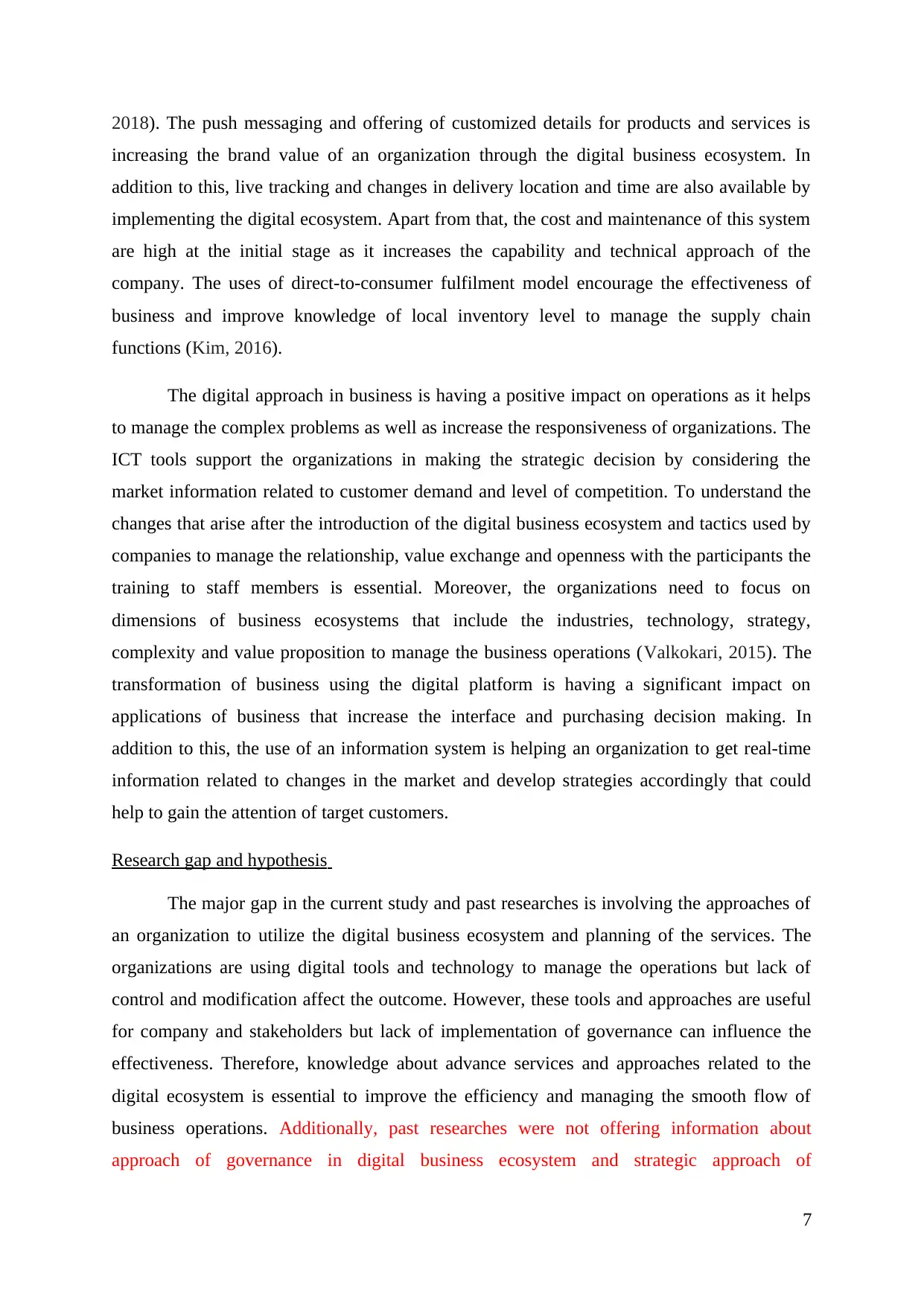
2018). The push messaging and offering of customized details for products and services is
increasing the brand value of an organization through the digital business ecosystem. In
addition to this, live tracking and changes in delivery location and time are also available by
implementing the digital ecosystem. Apart from that, the cost and maintenance of this system
are high at the initial stage as it increases the capability and technical approach of the
company. The uses of direct-to-consumer fulfilment model encourage the effectiveness of
business and improve knowledge of local inventory level to manage the supply chain
functions (Kim, 2016).
The digital approach in business is having a positive impact on operations as it helps
to manage the complex problems as well as increase the responsiveness of organizations. The
ICT tools support the organizations in making the strategic decision by considering the
market information related to customer demand and level of competition. To understand the
changes that arise after the introduction of the digital business ecosystem and tactics used by
companies to manage the relationship, value exchange and openness with the participants the
training to staff members is essential. Moreover, the organizations need to focus on
dimensions of business ecosystems that include the industries, technology, strategy,
complexity and value proposition to manage the business operations (Valkokari, 2015). The
transformation of business using the digital platform is having a significant impact on
applications of business that increase the interface and purchasing decision making. In
addition to this, the use of an information system is helping an organization to get real-time
information related to changes in the market and develop strategies accordingly that could
help to gain the attention of target customers.
Research gap and hypothesis
The major gap in the current study and past researches is involving the approaches of
an organization to utilize the digital business ecosystem and planning of the services. The
organizations are using digital tools and technology to manage the operations but lack of
control and modification affect the outcome. However, these tools and approaches are useful
for company and stakeholders but lack of implementation of governance can influence the
effectiveness. Therefore, knowledge about advance services and approaches related to the
digital ecosystem is essential to improve the efficiency and managing the smooth flow of
business operations. Additionally, past researches were not offering information about
approach of governance in digital business ecosystem and strategic approach of
7
increasing the brand value of an organization through the digital business ecosystem. In
addition to this, live tracking and changes in delivery location and time are also available by
implementing the digital ecosystem. Apart from that, the cost and maintenance of this system
are high at the initial stage as it increases the capability and technical approach of the
company. The uses of direct-to-consumer fulfilment model encourage the effectiveness of
business and improve knowledge of local inventory level to manage the supply chain
functions (Kim, 2016).
The digital approach in business is having a positive impact on operations as it helps
to manage the complex problems as well as increase the responsiveness of organizations. The
ICT tools support the organizations in making the strategic decision by considering the
market information related to customer demand and level of competition. To understand the
changes that arise after the introduction of the digital business ecosystem and tactics used by
companies to manage the relationship, value exchange and openness with the participants the
training to staff members is essential. Moreover, the organizations need to focus on
dimensions of business ecosystems that include the industries, technology, strategy,
complexity and value proposition to manage the business operations (Valkokari, 2015). The
transformation of business using the digital platform is having a significant impact on
applications of business that increase the interface and purchasing decision making. In
addition to this, the use of an information system is helping an organization to get real-time
information related to changes in the market and develop strategies accordingly that could
help to gain the attention of target customers.
Research gap and hypothesis
The major gap in the current study and past researches is involving the approaches of
an organization to utilize the digital business ecosystem and planning of the services. The
organizations are using digital tools and technology to manage the operations but lack of
control and modification affect the outcome. However, these tools and approaches are useful
for company and stakeholders but lack of implementation of governance can influence the
effectiveness. Therefore, knowledge about advance services and approaches related to the
digital ecosystem is essential to improve the efficiency and managing the smooth flow of
business operations. Additionally, past researches were not offering information about
approach of governance in digital business ecosystem and strategic approach of
7
Paraphrase This Document
Need a fresh take? Get an instant paraphrase of this document with our AI Paraphraser

implementing the digital business ecosystem. The current research will focus on the impact
and role of governance in digital approach on business outcome.
H0: Governance in digital business ecosystem is having a positive impact on the operations
of organizations
H1: Governance in digital business ecosystem is not useful for managing the operation of
organizations
8
and role of governance in digital approach on business outcome.
H0: Governance in digital business ecosystem is having a positive impact on the operations
of organizations
H1: Governance in digital business ecosystem is not useful for managing the operation of
organizations
8
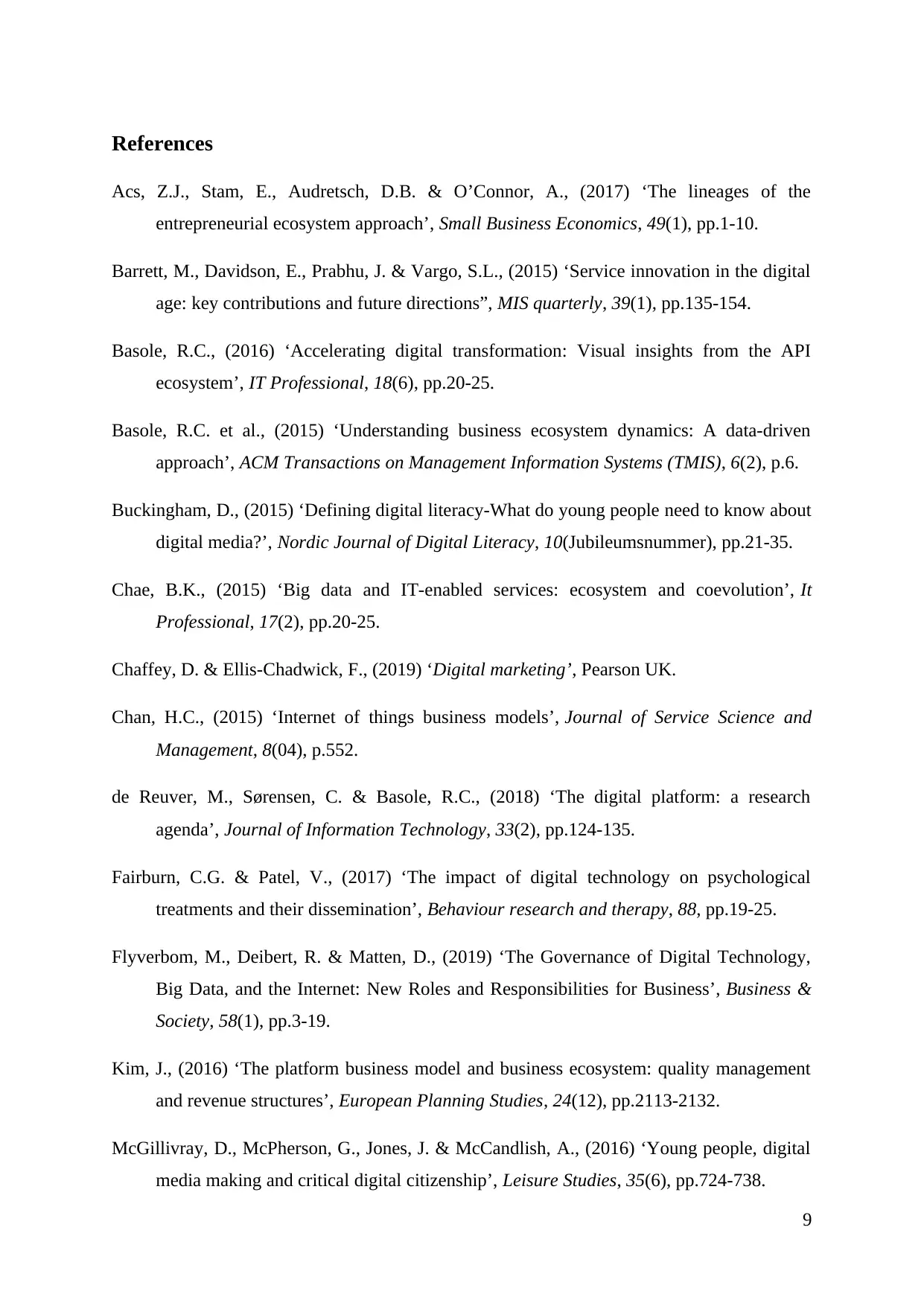
References
Acs, Z.J., Stam, E., Audretsch, D.B. & O’Connor, A., (2017) ‘The lineages of the
entrepreneurial ecosystem approach’, Small Business Economics, 49(1), pp.1-10.
Barrett, M., Davidson, E., Prabhu, J. & Vargo, S.L., (2015) ‘Service innovation in the digital
age: key contributions and future directions”, MIS quarterly, 39(1), pp.135-154.
Basole, R.C., (2016) ‘Accelerating digital transformation: Visual insights from the API
ecosystem’, IT Professional, 18(6), pp.20-25.
Basole, R.C. et al., (2015) ‘Understanding business ecosystem dynamics: A data-driven
approach’, ACM Transactions on Management Information Systems (TMIS), 6(2), p.6.
Buckingham, D., (2015) ‘Defining digital literacy-What do young people need to know about
digital media?’, Nordic Journal of Digital Literacy, 10(Jubileumsnummer), pp.21-35.
Chae, B.K., (2015) ‘Big data and IT-enabled services: ecosystem and coevolution’, It
Professional, 17(2), pp.20-25.
Chaffey, D. & Ellis-Chadwick, F., (2019) ‘Digital marketing’, Pearson UK.
Chan, H.C., (2015) ‘Internet of things business models’, Journal of Service Science and
Management, 8(04), p.552.
de Reuver, M., Sørensen, C. & Basole, R.C., (2018) ‘The digital platform: a research
agenda’, Journal of Information Technology, 33(2), pp.124-135.
Fairburn, C.G. & Patel, V., (2017) ‘The impact of digital technology on psychological
treatments and their dissemination’, Behaviour research and therapy, 88, pp.19-25.
Flyverbom, M., Deibert, R. & Matten, D., (2019) ‘The Governance of Digital Technology,
Big Data, and the Internet: New Roles and Responsibilities for Business’, Business &
Society, 58(1), pp.3-19.
Kim, J., (2016) ‘The platform business model and business ecosystem: quality management
and revenue structures’, European Planning Studies, 24(12), pp.2113-2132.
McGillivray, D., McPherson, G., Jones, J. & McCandlish, A., (2016) ‘Young people, digital
media making and critical digital citizenship’, Leisure Studies, 35(6), pp.724-738.
9
Acs, Z.J., Stam, E., Audretsch, D.B. & O’Connor, A., (2017) ‘The lineages of the
entrepreneurial ecosystem approach’, Small Business Economics, 49(1), pp.1-10.
Barrett, M., Davidson, E., Prabhu, J. & Vargo, S.L., (2015) ‘Service innovation in the digital
age: key contributions and future directions”, MIS quarterly, 39(1), pp.135-154.
Basole, R.C., (2016) ‘Accelerating digital transformation: Visual insights from the API
ecosystem’, IT Professional, 18(6), pp.20-25.
Basole, R.C. et al., (2015) ‘Understanding business ecosystem dynamics: A data-driven
approach’, ACM Transactions on Management Information Systems (TMIS), 6(2), p.6.
Buckingham, D., (2015) ‘Defining digital literacy-What do young people need to know about
digital media?’, Nordic Journal of Digital Literacy, 10(Jubileumsnummer), pp.21-35.
Chae, B.K., (2015) ‘Big data and IT-enabled services: ecosystem and coevolution’, It
Professional, 17(2), pp.20-25.
Chaffey, D. & Ellis-Chadwick, F., (2019) ‘Digital marketing’, Pearson UK.
Chan, H.C., (2015) ‘Internet of things business models’, Journal of Service Science and
Management, 8(04), p.552.
de Reuver, M., Sørensen, C. & Basole, R.C., (2018) ‘The digital platform: a research
agenda’, Journal of Information Technology, 33(2), pp.124-135.
Fairburn, C.G. & Patel, V., (2017) ‘The impact of digital technology on psychological
treatments and their dissemination’, Behaviour research and therapy, 88, pp.19-25.
Flyverbom, M., Deibert, R. & Matten, D., (2019) ‘The Governance of Digital Technology,
Big Data, and the Internet: New Roles and Responsibilities for Business’, Business &
Society, 58(1), pp.3-19.
Kim, J., (2016) ‘The platform business model and business ecosystem: quality management
and revenue structures’, European Planning Studies, 24(12), pp.2113-2132.
McGillivray, D., McPherson, G., Jones, J. & McCandlish, A., (2016) ‘Young people, digital
media making and critical digital citizenship’, Leisure Studies, 35(6), pp.724-738.
9
⊘ This is a preview!⊘
Do you want full access?
Subscribe today to unlock all pages.

Trusted by 1+ million students worldwide
1 out of 14
Related Documents
Your All-in-One AI-Powered Toolkit for Academic Success.
+13062052269
info@desklib.com
Available 24*7 on WhatsApp / Email
![[object Object]](/_next/static/media/star-bottom.7253800d.svg)
Unlock your academic potential
Copyright © 2020–2026 A2Z Services. All Rights Reserved. Developed and managed by ZUCOL.





